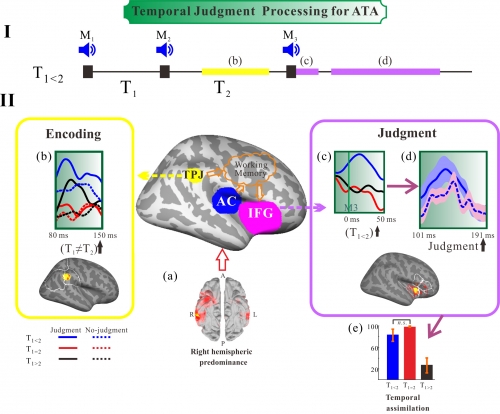研究成果 Research Results
- TOP
- News
- Research Results
- Right-hemispheric neural network as a cognitive clock in the human brain
Right-hemispheric neural network as a cognitive clock in the human brain
2017.09.29Research ResultsLife & Health
The time perception literature has argued that varieties of human behavior may rely on the perception of time in the seconds-to-minutes range. Interestingly, temporal judgments at sub-second timing sometimes lead to various types of perceptual distortions (i.e., illusion) in several modalities. Here, the research group of Kyushu University in collaboration with RIKEN reports an illusory perceptual phenomenon in auditory modality (auditory temporal assimilation: ATA), and demonstrates the spatio-temporal dynamics of its neuronal network using magnetoencephalography. The different processing stages, such as attending to time, encoding an interval and keeping the representation of duration in working memory, and decision processes are suggested to be involved in the processing of time. Furthermore, distinct brain regions are recruited to process each temporal stage at different timing. This study has made a new advancement in exploring the clock in the human brain.
For more information, see
www.nature.com/articles/s41598-017-11631-0
Naruhito Hironaga, Takako Mitsudo, Mariko Hayamizu, Yoshitaka Nakajima, Hiroshige Takeichi, Shozo Tobimatsu: “Spatiotemporal brain dynamics of auditory temporal assimilation” Scientific Reports, doi: 10.1038/s41598-017-11631-0.

Fig. 1.
A graphic summary of our findings and a hypothetical illustration of the temporal judgment network for ATA
Journal Reference
Spatiotemporal brain dynamics of auditory temporal assimilation, ,Scientific Reports, 10.1002/anie.201706142Research-related inquiries
Shozo Tobimatsu, Professor, Faculty of Medical Sciences
Yoshitaka Nakajima, Faculty of Design
https://www.med.kyushu-u.ac.jp/neurophy/
Yoshitaka Nakajima, Faculty of Design
https://www.med.kyushu-u.ac.jp/neurophy/
- TOP
- News
- Research Results
- Right-hemispheric neural network as a cognitive clock in the human brain































